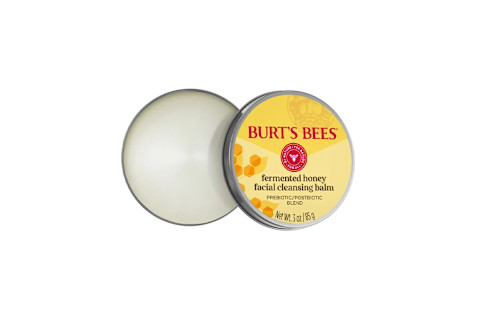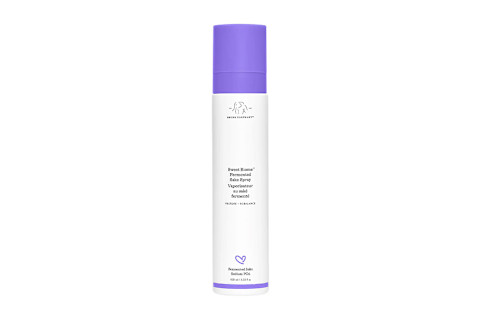So, What Does Fermented Skin Care Actually Mean? Benefits & Best Products

Known for boosting digestion, fermented foods have long been a staple for health-forward individuals. We understand just how these foods nourish our guts and, in turn, keep our complexions glowing. But applying them topically? You likely have some questions. Fermented skin care is highly technical, but you've come to the right place to sate your curiosity!
The category has roots in K-beauty (not surprising; most innovative skin care methods do), but the science has been stateside for a while now. Still, you're not alone if you have questions about it. Below, experts explain everything you need to know.
What is fermented skin care?
When a skin care ingredient is fermented, that means it's been broken down in a lab by specific beneficial microorganisms (think bacteria or yeast). Through enzymatic reactions, it gets deconstructed into its simpler, smaller parts.
"Fermentation is one of the oldest technologies in science," notes clean cosmetic chemist and founder of KKT Consulting Krupa Koestline, but in skin care, she says it can mean a few different things:
- Fermentation can generate ingredients like collagen, squalane, CoQ10, butylene glycol, or elastin using biotechnology, she says. "This is a more sustainable way to source ingredients, like squalane, for example."
- Or, fermented products can contain ferment extracts and ferment filtrates, which are brimming with skin-healthy compounds like antioxidants, peptides, and vitamins. These are often sourced botanically and then purified in a lab.
- Fermentation can also mean the product is formulated with cell lysates. "This contains everything inside the cell and is very nutrient-rich," Koestline adds.
In terms of botanical sources, "Fermented skin care ingredients are typically sourced from natural plants and fruits, such as lemon peels, sugar cane, or rice," says Teresa Song, M.D., board-certified dermatologist at Marmur Medical.
These ingredients contain beneficial amino acids, beta glucans, vitamins, peptides, and ceramides, she adds, and through the fermentation process, these molecules become more easily absorbed by the skin.
"The process itself also helps to preserve the product with antimicrobial properties," Song adds. That's why you may see "lactobacillus ferment" included in some organic preservative systems; it not only has hydrating and skin-soothing benefits but also is naturally antimicrobial.
Fermented vs. biotic skin care
Now, people tend to say fermented and pro- and postbiotic skin care in the same breath, but the two categories are slightly different.
"Both fermented and probiotic/postbiotic skin care uses beneficial microorganisms," says Song, but fermented skin care uses organic molecules from natural botanical sources, like honey, sugar cane, lemon, etc.
Biotic skin care, however, doesn't have to come straight from the plant source. Researchers have been able to identify specific, beneficial outputs from the bacteria living on our skin naturally (peptides, fatty acids, etc.) and recreate them en masse.
"Postbiotic skin care is similar to fermented skin care, where the byproduct from the microorganism is utilized, which can contain nourishing skin foods such as peptides and fatty acids," says Song. Similar to fermented skin care, yes, but not the same thing.
"Since fermentation is used to produce ingredients like squalane and CoQ10 through genetically modified microorganisms (mostly bacteria and yeast) to selectively produce ingredients, the focus is, therefore, not on the probiotics and postbiotics itself but rather on the technology," Koestline adds.
Benefits
When you think about the gut-skin axis, it makes sense why fermented ingredients are so good for your complexion. What you put in your mouth indeed influences your skin1, which is why eating fermented foods is an A+ idea for skin health. But topically, fermented staples can serve your skin barrier too.
Below, some reasons to include ferments in your beauty routine:
- Helps ingredients penetrate the skin: "Due to the fermentation process, there is a better delivery compared to traditional skin care actives," says cosmetic chemist Abena Antwi. Breaking down the molecules into smaller sizes enhances penetration and makes them more easily absorbed by the skin cells.
- Feeds the skin microbiome: The fermentation process also creates amino acids, vitamins, peptides, and other proteins that "serve as healthy skin food for the skin's microbiome," says Song. "The digested ingredients are sensitive and suitable to support our microbiome, which can contain similar microorganisms."
- Has exfoliating properties: Fermented ingredients can also result in lactic acid, a beloved exfoliator that gently resurfaces the skin.
- Soothes skin: "This process also helps break down the proteins within the specific ingredient, which makes it less likely to irritate the skin," says Antwi.
Who should use it?
Since the process makes actives more soothing, fermented skin care is top-notch for those with sensitive skin. "The fermentation process mimics the biological process of breaking down organic compounds, such as plants and fruits and generally yields organic byproducts like peptides and organic acids that are well tolerated by sensitive skin," says Song.
Fermented ingredients also have a more acidic pH, which makes them more tolerable to the skin (which has a slightly acidic pH), Koestline adds.
But generally, fermented skin care is great for all skin types. "Depending on the byproducts from the process, it can be protective for skin barrier, hydrating, or gently exfoliating to address dryness and uneven texture of skin," Song adds.
For example, healthy bacteria isolated from kimchi has been found2 to reduce the growth of C. acnes, aka, the acne-causing bacteria, while ferments from kombucha are associated with increased skin hydration3.
Essentially, fermented ingredients and their unique byproducts can target multiple concerns, from dryness to dullness to acne to fine lines and more. You're bound to find one that fits your skin goals—see below for some of our fermented favorites.
The takeaway
Fermented actives are smaller, simpler molecules that can penetrate deeper into the skin, feed the microbiome, and soothe sensitive skin. Plenty of ingredients can undergo fermentation in the lab—it's not just kimchi, miso, and kombucha in the game—so you've probably slathered some on without even realizing it. Regardless, it's not a bad idea to prioritize fermented foods and skin care formulas in your beauty regimen.





